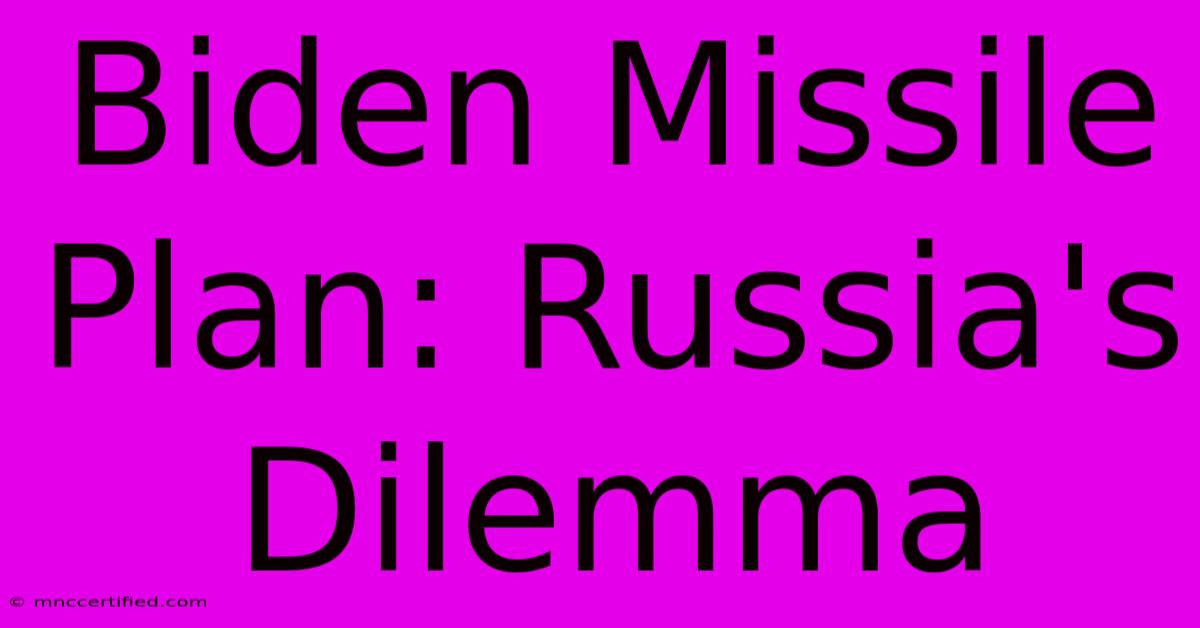Biden Missile Plan: Russia's Dilemma

Table of Contents
Biden's Missile Plan: Russia's Dilemma
President Biden's recent announcements regarding missile defense systems and potential arms control agreements have placed Russia in a complex dilemma. This article will delve into the specifics of Biden's plan, analyze its implications for Russia, and explore the potential ramifications for global security.
Understanding Biden's Missile Defense Strategy
Biden's approach to missile defense can be characterized by a two-pronged strategy: strengthening existing systems and seeking renewed dialogue on arms control. This involves:
-
Modernizing existing missile defense systems: This includes upgrading radar capabilities, improving interceptor technology, and expanding deployment areas. The focus seems to be on enhancing defenses against ballistic missiles, particularly those launched from rogue states or potential near-peer adversaries.
-
Exploring new arms control agreements: While maintaining a strong defense posture, the Biden administration has signaled a willingness to engage Russia in discussions regarding limitations on missile development and deployment. This contrasts with the Trump administration's withdrawal from the Intermediate-Range Nuclear Forces (INF) Treaty. However, the current geopolitical climate makes such negotiations incredibly challenging.
The Key Concerns for Russia
Biden's missile plan presents several challenges for Russia:
-
Undermining Russia's nuclear deterrent: The modernization of US missile defense systems potentially reduces the effectiveness of Russia's nuclear deterrent. If Russia believes its nuclear weapons can be intercepted, this could decrease its perceived strategic advantage. This fuels concerns about a potential arms race.
-
Heightened tensions and mistrust: The very act of enhancing missile defenses can be viewed as a provocative act by Russia, increasing mistrust and escalating tensions. The lack of transparency surrounding specific details of the US systems further exacerbates these concerns.
-
Pressure to escalate its own military spending: In response to perceived threats, Russia may feel compelled to increase its own military spending, including developing more advanced missiles and countermeasures, leading to a costly and potentially destabilizing arms race.
-
Limited negotiation leverage: The current state of US-Russia relations, marked by the war in Ukraine and various sanctions, severely limits the possibilities for meaningful arms control negotiations. Trust is at an all-time low, making agreements difficult to achieve and maintain.
The Global Security Implications
The success or failure of Biden's missile plan has far-reaching consequences for global security:
-
Potential for escalation: A new arms race could lead to increased instability and a higher risk of miscalculation or accidental conflict. This is particularly concerning given the current geopolitical climate.
-
Impact on regional stability: The deployment of advanced missile defense systems could have significant implications for regional stability, particularly in areas of existing geopolitical tensions.
-
The future of arms control: The outcome will significantly influence the future of international arms control agreements and efforts to limit the proliferation of weapons of mass destruction.
Russia's Strategic Response
Russia's response to Biden's missile plan will be crucial. It could involve:
-
Further military modernization: A significant increase in military expenditure focused on developing advanced missile systems and countermeasures.
-
Increased diplomatic efforts: Attempts to build alliances and garner support from other countries concerned about the US missile defense strategy.
-
Cyber warfare and information operations: Utilizing cyberattacks and disinformation campaigns to undermine the US missile defense program and create instability.
-
Renegotiation of arms control agreements: Seeking new or revised arms control agreements that address Russia's concerns about US missile defense capabilities.
Conclusion: A Precarious Balance
Biden's missile plan presents a significant dilemma for Russia. It forces Russia to choose between escalating the arms race or engaging in potentially fruitless negotiations. The outcome will profoundly affect global security and the future of international relations. The path forward requires careful diplomacy, transparency, and a commitment to de-escalation from all parties involved to prevent a dangerous and destabilizing arms race. The stakes are high, and the world watches with bated breath.

Thank you for visiting our website wich cover about Biden Missile Plan: Russia's Dilemma. We hope the information provided has been useful to you. Feel free to contact us if you have any questions or need further assistance. See you next time and dont miss to bookmark.
Featured Posts
-
Kerr Mewis Announce Pregnancies
Nov 19, 2024
-
Homeowners Insurance Arlington Tx
Nov 19, 2024
-
Donate Blood Chiefs Week
Nov 19, 2024
-
Pacific Insurance Company Limited
Nov 19, 2024
-
Nations League Scotlands Final Push
Nov 19, 2024